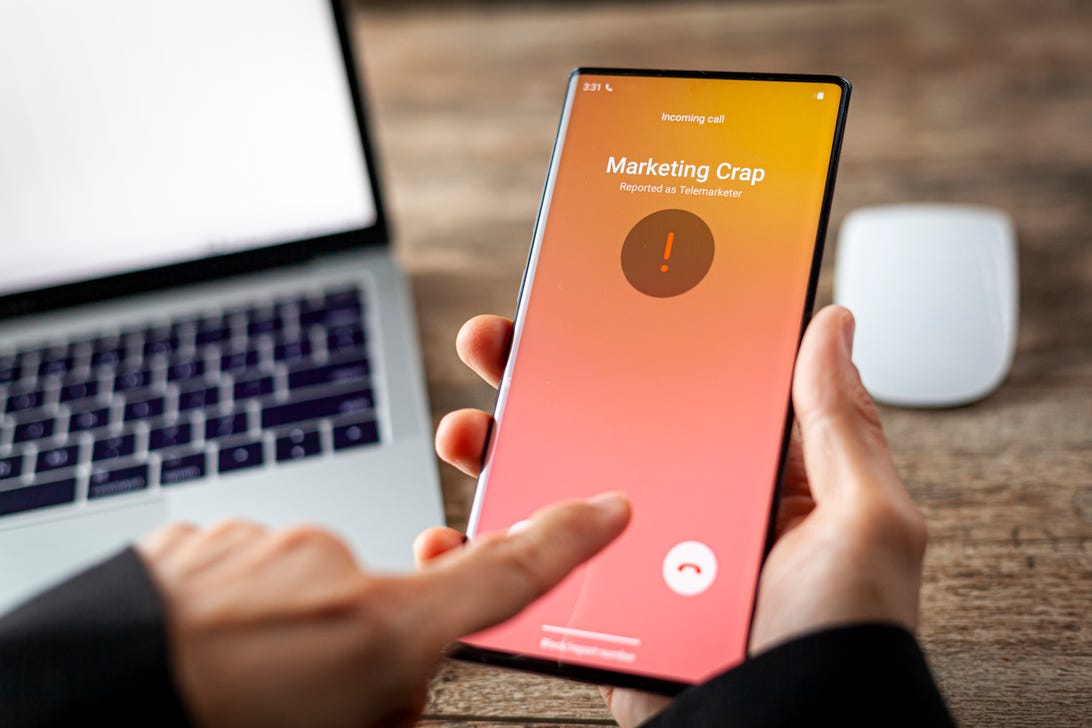
A growing number of annoying robocalls are coming from overseas. The FCC wants to do something to stop that.
Grandbrothers via GettyEnding robocalls is almost like a game of whack-a-mole: Stop one and more pop up. But Jessica Rosenworcel, acting chair of the Federal Communications Commission, thinks she's found a new hammer to stop the illegal automated spam calls originating from overseas.
She's proposing to close a loophole in FCC regulations to require "gateway providers" to stop robocalls before they get to your phone. The agency will vote on the proposal, called the Targeting Gateway Providers to Combat Illegal Robocalls, during its monthly meeting on Tuesday.
The proposed regulation would put additional requirements on US-based gateway providers that pass through voice traffic to other networks in the US. These gateway providers, which are smaller, low-profile companies that hand off calls from network to network, are often used by foreign scammers to disguise phone calls entering the US. The new FCC requirements would ensure that the gateway providers are verifying calls before they pass them on to other operators in the US.
"What we're doing is saying that the first gateway provider into the United States has some responsibilities," Rosenworcel said in an interview with CNET this month. "By imposing these requirements to identify where the traffic is coming from, we're going to stop illegal robocalls before they reach you in your home."
The proposal is the latest effort from the FCC to beat back those annoying robocalls. For years, the scourge of illegal, recorded spam calls has plagued the public. It's the No. 1 consumer complaint made to the FCC and a top priority at the commission. US consumers have received just under 22 billion robocalls in the first five months of the year and are on pace to hit over 52 billion robocalls for the year, according to YouMail, a company specializing in blocking robocalls.
These calls aren't just annoying. Nearly 60 million Americans say they've fallen victim to a phone scam in the past year, like the calls purporting to be from the IRS or from a company inquiring about an expiring warranty on a nonexistent car, according to a report from TrueCaller, a company that makes a spam-blocking and caller ID app. In total, Americans have been swindled out of nearly $30 billion by phone scams over the past 12 months, according to the survey conducted by TrueCaller and The Harris Poll.
Beyond US borders
The FCC set a deadline of June 30, 2021, for every major voice provider in the US to implement a technology called Stir/Shaken. It's designed to verify the number that pops up on caller ID is legitimate. As of Tuesday, any provider that hasn't complied with these mitigation efforts would be blocked.
While Stir/Shaken and other FCC efforts are expected to at least slow the tide for these annoying calls, experts note there's still a big problem in stopping the calls coming in from outside the US, because US regulators and law enforcement are unable to enforce US laws overseas.
"We're hearing from a lot of the domestic carriers that an increasing number of calls are coming from abroad -- the ones that look like they're scams," Rosenworcel said. She added that it has been especially challenging for US regulators and law enforcement to trace criminals back into "jurisdictions where there might be some actors who can scurry away before we can find them."
She also noted that "difficult diplomatic relationships between the US and other countries can make it difficult to bring those bad actors to justice in the US. But she emphasized that the agency needs to "find ways to stop them."
It's an issue experts agree needs to be addressed. Efforts like Stir/Shaken have pushed more illegal robocallers outside the US, said Clayton LiaBraaten, senior advisory board member at Truecaller.
Combating the problem will require more cooperation among international carriers and regulators, which LiaBraaten admits is no easy task. But he thinks world leaders, international regulators and carriers throughout the world will be motivated to work together.
"That's a tall order trying to get a bunch of multilateral agreements in place," LiaBraaten said. "But this isn't just an American problem. It's a global problem. People are being defrauded all over the world."
Ending the scourge of robocalls will also require coordinated effort within the US, Rosenworcel said. The FCC needs to work with other federal agencies like the Federal Trade Commission as well as state agencies like attorneys general offices around the country to bring enforcement actions against those who break the law in perpetuating these calls, she said.
Rosenworcel pointed to the FCC's $225 million fine -- the largest in the agency's history -- against Texas-base telemarketers in March. The companies were accused of transmitting about 1 billion robocalls to sell fake health insurance policies. She said the FCC worked with the Ohio attorney general's office on this case.
"With coordinated activity -- with many more mallets smacking this problem -- we're going to be more capable of bringing it to a stop," Rosenworcel said. "More of that federal-to-federal and federal-to-state coordination is going to be necessary in order for us to be successful."
"We're just getting started," she added. "We have more work to do, and we have a new vigor to make it happen."
"Many" - Google News
September 30, 2021 at 07:00PM
https://ift.tt/3F2vvCh
How the FCC plans to stop robocalls where many start: Overseas - CNET
"Many" - Google News
https://ift.tt/2QsfYVa
Shoes Man Tutorial
Pos News Update
Meme Update
Korean Entertainment News
Japan News Update
Bagikan Berita Ini















0 Response to "How the FCC plans to stop robocalls where many start: Overseas - CNET"
Post a Comment